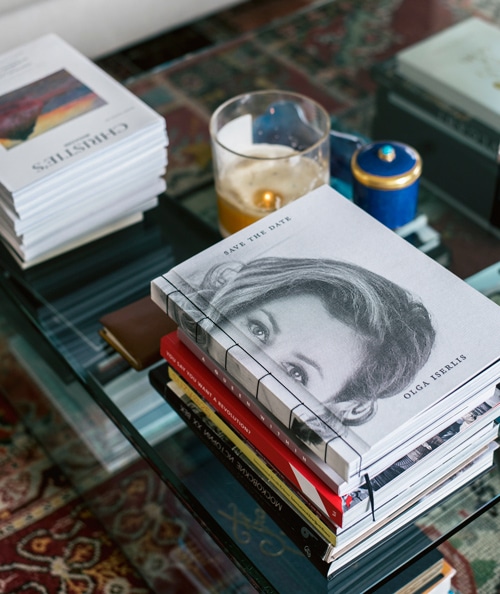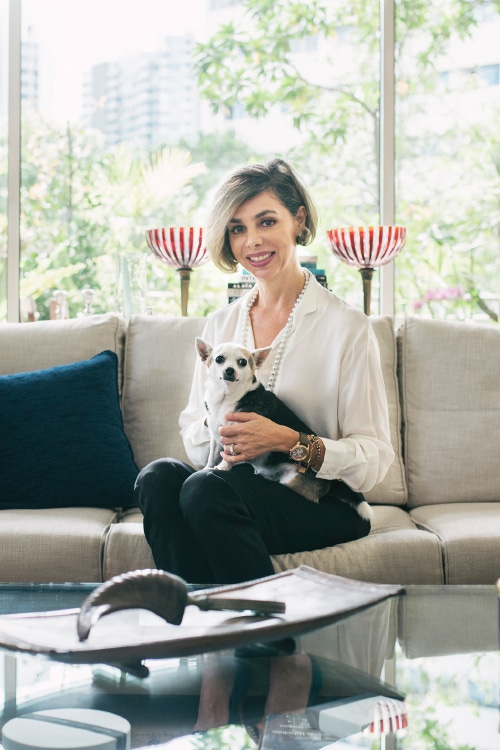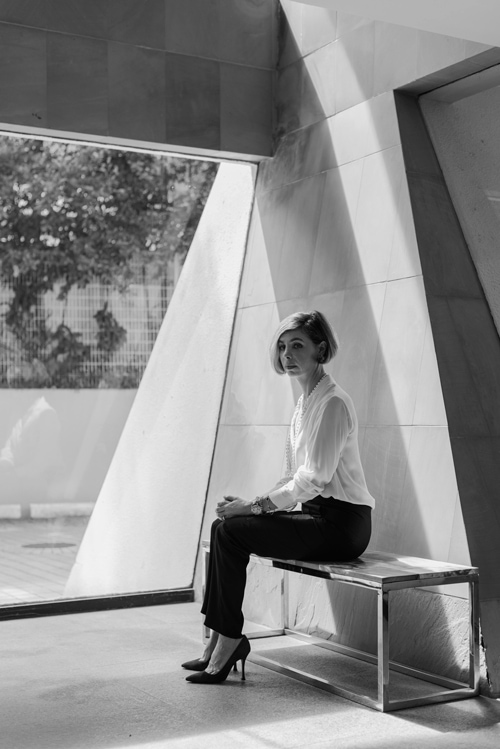Olga Iserlis is wearing a creamy silk blouse with tailored black pants and pointed suede heels. Softly glowing pearls drape casually around her neck, and her light blonde hair is perfectly coiffed even though it is only ten in the morning, at her apartment along Cairnhill Road. She is so exquisitely put together that I cannot help but be reminded of a well-crafted luxury piece: tastefully made and beautifully finished, capable of withstanding scrutiny down to the very last stitch or detail. One would expect no less than perfection from the woman widely considered to be the event planning extraordinaire of Singapore’s high society. With guests who are a veritable checklist of local and international who’s who in town, Olga has organised soirees, launches and shows for luxury brands, dignitaries and creative virtuosos, conjuring up fantastic and otherworldly celebrations that are highly feted by those lucky enough to attend. It might be easy to judge or dismiss such extravagance, but Olga is clear-eyed about her purpose. “I try very hard not to feed into the superficial. I believe cultural education is very important, which is why for all the events I do, I aim to raise awareness and cultivate people’s interest in a subject. It has to be more holistic than just dressing up and raising money.” I am surprised by the earthy quality of Olga’s voice. Distinctly feminine, it is rich and full-bodied in tone, harbouring the mellow expressiveness of a finely bowed cello or a “blue note” in jazz—two of her favourite sounds in music. As she opens up about her life and the winding paths to get to where she is today, I discover a multifaceted and heartfelt individual. Olga was born in Russia to Jewish intelligentsia parents whose community suffered persecution under the Soviet government. Escaping to New York when she was just fifteen, her family’s changed fortunes and trying circumstances did not prevent her from finding her way back into a beloved world of arts and culture–one that she grew up in. She says, “I am glad to be alive and to have been given the opportunities to do what I want. . . There are plenty of Russian-Jewish immigrants in New York who’ve been through similar journeys, but I’m grateful to have overcome the difficult circumstances of my early years.” A survivor of some of life’s most dramatic vagaries, the sincerity and wholeheartedness of Olga's approach to each project is deeply rooted in a profound joy for living. And perhaps therein lies the magic to her outstanding galas and balls—they are simply “celebrations of life”.
Conversations with Olga Iserlis
TEO REN FENG: You organise important society events, and work with top-tier brands and partners. What does the word “luxury” mean to you?
OLGA ISERLIS: I have given talks to advertising companies and bankers about what “luxury” means, and I always use this example: It is not difficult to order $500 flowers and make a beautiful presentation to a client. What is much more difficult, is to order a $100 bouquet and package it as a $500 experience. Luxury lies in the essence of one’s creativity—your special touch or finesse.
REN FENG: You don’t have to spend a million, to look like a million?
OLGA: The feel and look of an event are irrelevant to the budget. Sometimes when I look at events and weddings being done here, I can tell that the budget was very, very high. And if it were up to me, I would have done it differently—and quite possibly in a more inexpensive manner. I wouldn’t necessarily say that someone dressed in head-to-toe designer clothing is beautiful. Sometimes less is more, though if a theme calls for it to be over-the-top, I will do it. Everything is about finesse: the way you behave and talk, and how you present something to an audience.
REN FENG: What’s something you know you do differently from other event planners?
OLGA: I never use templates. If I’ve done an event before, it doesn’t mean that I will do it the same way again. I begin each project from scratch—with an empty canvas. That helps to free my mind, allowing me to create and discover new things.
REN FENG: You’ve mentioned that inspiration for your events can sometimes come mere weeks before the date. How do you manage such risks?
OLGA: Thankfully, inspiration always comes to me at the right time. [laughs] When an idea hits me, I begin to shape the whole event in my head. Thereafter, it is merely execution and I shift my focus to a different project.
I love classical music, and if I don’t listen to it or go to concerts, I become very edgy.
REN FENG: Do you have a ‘go-to’ muse or source of inspiration?
OLGA: I don’t have a ‘go-to’ source for inspiration. I love classical music, and if I don’t listen to it or go to concerts, I become very edgy. I need it like air and it is very important to me. Classical jazz is another genre that I really like too. I also enjoy walking on the streets—I will never forget the time when I was studying at NYU and lived on 17th & Gramercy Park. Some of my classes were at Washington Square and in the evenings, I would walk home and look into the windows of the buildings because I loved imagining the different worlds inside of each. Whenever I’m in New York, Paris or London, I still enjoy taking strolls at night and window-gazing.
REN FENG: Twise has made a name for being creative, original and the ability to execute events well. Have you encountered copycats or partners who have jeopardised your reputation?
OLGA: I’ve had a few unpleasant experiences. One of them was an event organiser, who did not know what I do for a living. He approached me thinking that I could be a client and I saw a picture of my work in his portfolio, so I asked him: That looks good! Tell me about it. He obviously couldn’t give me a clear answer, yet I chose not to say anything about it. Another time, I was called to take care of the entertainment at a particular event. It was a significant event with important people attending, and I delivered on my part. However, the rest of the event didn’t live up to its mark, and some guests who saw me, came over to complain about the food and organisation. People just associated me with the entire event even though I wasn’t in-charge. So, I’m quite careful now with who I invite or work with. Even when I work with brands, I always make sure to know the details on their side. Whether it’s the champagne, set-up or presentation, I will handle it if I feel it is not up to my standards.
REN FENG: Would you consider yourself a perfectionist?
OLGA: Absolutely.
REN FENG: Do you struggle with being one?
OLGA: It is hard for me. I am a bit of a control freak and I demand so much of myself that it is often easier to work on my own than to delegate. I’m still learning to let go and I’ve stopped stressing about life and things in general. I’ve realised stress really doesn’t help anything, so I just move on!
I am very critical and demanding of myself—I know to what degree I deserve to be praised, and when I get it, I’m very happy.
REN FENG: Does pure passion for your work drive you or are there other motivations?
OLGA: Passion would probably be 70% of it. Different factors make up the rest. It’s a duty, I would say, to contribute to society and to achieve something for myself. I grew up in the Soviet Union with intelligentsia parents who were well-established and accomplished young professionals during their time. I was a good student who did everything right, but was never praised for anything. It might have been cultural—so somehow, I always crave some sort of recognition in whatever I do, which is why I constantly try to please others and strive to do better. I’m not saying it is necessarily a good trait, but as it is, I take pride in my work. I am very critical and demanding of myself—I know to what degree I deserve to be praised, and when I get it, I’m very happy.
REN FENG: In your book, Save the Date, you talk about your formative years in New York. What do you miss the most about that period?
OLGA: Making decisions were much simpler back then, and I miss that. Also, the sincerity of people as compared to today.
REN FENG: What has changed?
OLGA: One will always feel nostalgic about the younger years. At the end of the day, you reminisce and hopefully remember more of the good than bad. It’s natural to be wistful.
REN FENG: How long did Save the Date take to complete?
OLGA: About a year. The idea actually came about 2 years ago, and it had been weighing on me. So in early 2016, I decided that I’d better get cracking and by hook or by crook, publish it within the year.
REN FENG: From what I have seen, it is clear that you don’t do things by half.
OLGA: If you spend energy and time doing things, you might as well do it to the best of your ability.
REN FENG: It’s a beautiful book and I found it much more engaging than most coffee table books.
OLGA: Sometimes with coffee table books, even though they are so beautiful, you only look at it once before putting it aside and it pretty much gets forgotten. I wanted to create a book that is multi-dimensional because I deal with a lot of different shapes and textures when I create each event. I want it to be immersive for the reader, so you can go back to a particular page and notice different elements. I’ve also included little snippets of related information for people to learn and remember something beyond the cursory.
REN FENG: The book also showed me a lot about your thought process and how you develop your ideas—it’s almost like an artist’s retrospective.
OLGA: Yes, I did not want a book that was an A-to-Z on how I execute an event. What I wanted was something more artsy, where you could not only “see” the process, but also get a “feel” of the era, the colours, ideas and history driving my vision. I did not compile the photos based on any chronology or event. In fact, I repeat pictures of certain events. For example, this [points to a page in the book] is a picture of a crowd in New York in the 1950s, juxtaposed against a gathering of people at an event we organised—we put the old and new together, which adds dimension and creates a setting for the reader.
I treasure it when people share with me the little moments and details they enjoyed the most.
REN FENG: What do you think is most special about your contributions to the events scene?
OLGA: My personal touch—sharing a bit of the world through my eyes. There are so many dinners, galas and gatherings that attendees cannot possibly remember and enjoy every single bit. So whether it is a particular course, a drink, the flowers or a conversation, I treasure it when people share with me the little moments and details they enjoyed the most. That is what I strive for.
REN FENG: You have a strong interest in the arts, and play an active role in promoting the local arts culture. Do you feel that Singapore has the potential to become at the very least, a regional centre for the arts?
OLGA: I think there is definitely potential—it’s still a journey… an education process because Singapore is still a very young society. I grew up heavily influenced by the arts and culture of Russia. For me it was non-negotiable, we went to the museums like the Hermitage, and it was such a normal thing to do. It is important to start young and groom people so that it becomes part of their lives. Artificially bringing in shows and artists and doing the vernissages are great, but it’s only part of the process. The emphasis has to be on the younger generation. I played the violin though I’m not a musician, studied literature though I’m not a writer, and I’m interested in art, even though I cannot paint at all—zero talent. [laughs] But I guess all these factors led me to an environment where I’m able to express my creativity—my events are celebrations of life.
REN FENG: What are you most grateful for in life?
OLGA: For life itself! I am glad to be alive and to have been given the opportunities to do what I want… This journey that I’ve had wouldn’t have happened without my mother leaving Russia. Because to tell you the truth, I don’t know what would have happened to us if my mother did not bite the bullet back then. There are plenty of Russian-Jewish immigrants in New York who’ve been through similar journeys, but I’m grateful to have overcome the difficult circumstances of my early years.
If I don’t go through life with a smile, or with a sense of gratitude, I don’t think I could ever be happy.
REN FENG: What is your happiest moment so far?
OLGA: I believe that happiness is sometimes really just a self-imposed state. Only you can make yourself happy. You cannot rely on others for happiness. If you start believing in this notion, you become a happier person. I’ve been through a lot in my life, [voice cracking with emotion] very, very difficult points. If I don’t go through life with a smile, or with a sense of gratitude, I don’t think I could ever be happy. Every part of my life has given me moments to be happy about.
REN FENG: Who or what is the greatest love of your life?
OLGA: My children.
REN FENG: What is your greatest accomplishment?
OLGA: At this juncture, the birth of my children… maybe there are better things to come, but I just don’t know yet.
REN FENG: Your children seem very important to you.
OLGA: Yes.
REN FENG: What do you want your legacy to be for them?
OLGA: I want them to be proud of me. I’ve raised my kids to be kind, to follow their goals and strive for the best. I always tell them to never compromise on the things that are important to them and to love oneself. You don’t have to be selfish about it, but if you love yourself, you can give so much more to others.
****
Edited by Wy-Lene Yap





